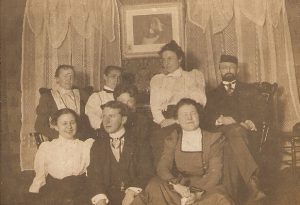 Back row, left to right: Eva Homer Keck, Bert Keck, Jennie Stinson Homer, Fred Lincoln Homer. Front row, left to right: Edna Stephenson Fields, Frank Fields, ???, Sarah Stephenson Ely.
Back row, left to right: Eva Homer Keck, Bert Keck, Jennie Stinson Homer, Fred Lincoln Homer. Front row, left to right: Edna Stephenson Fields, Frank Fields, ???, Sarah Stephenson Ely.
When beginning genealogical research, we learn about the types of records that are likely to contain the information we seek and where those records might be located, i.e. in what repository. What we sometimes fail to appreciate, however, is the value of a stash of family materials – letters, diaries, newspaper clippings – that can hold the answer to our questions. Case in point: my great-grandfather’s cause of death.
As an inquisitive 12-year-old, I once asked my grandmother if she knew how her father had died, since he had passed away four months before she was born. “Oh, he died from the hiccups,” she replied. Really?!? thought I – I’d never heard of such a thing, that couldn't be true. A bit later I asked my mother about her grandfather’s death. She filled the story in a bit and told me that Fred L. Homer had died in “Indian Territory” while on a trip to the Southwest for his health (he believed he had consumption). He traveled with his uncle Friend Cook and he died after eating a pot of undercooked beans. Hmmm. A bit more believable than hiccups. The mystery lay percolating in the back of my head for several decades.
About five years ago, I found a 1903 newspaper article from the Greenville (Pennsylvania) Evening Record which announced that Fred Homer had died from pneumonia in New Mexico on 31 January 1903. Ah. Now that is more believable! Greenville was the Homer ancestral location and where pregnant Jennie was staying with her two-year-old son while Fred was away.
Then, three years ago, my sister sent me a priceless Christmas present: a box of old letters and other papers. In the box were the weekly letters between Fred Homer and his wife Jennie, written between September 1902, when Fred left Cleveland for the southwest, and January 1903, when he died.
The letters describe Fred’s journey from Cleveland to Norman, Oklahoma, by train and then by horse and covered wagon across Oklahoma Territory, through the Texas high plains region and finally into New Mexico Territory. The almost daily missives paint a picture of a desolate landscape punctuated by occasional towns or outposts, and described the weather (frequent biting wind) and meals, which seemed to consist mostly of beans, coffee, and molasses. When the travelers were lucky, they shot rabbit or quail to add to the pot.
January 16th is the last letter from Fred. On 26 January Friend Cook wrote Jennie that Fred had been sick with bilious fever for some 8–10 days and was too weak to write. At that time, bilious fever described any high fever associated with gastrointestinal symptoms. And Fred had had the symptoms for days: high fever, delirium, lethargy, and then diarrhea, a classic typhoid fever presentation.[1] Friend’s last letter, on 30 January, told Jennie that Fred had developed hiccups and had hiccupped off and on for nearly 12 hours. Further research told me that hiccups in typhoid fever are the first symptom of intestinal perforation. Friend’s last words to Jenny, written in the margin of his 30 January letter, were “Fred passed away at 1:05 am, 31st without a struggle. God help you Jennie.”
So my grandmother and my mother were both correct. Fred did experience prolonged hiccups the day he died. And he probably contracted typhoid fever from something he ate, but perhaps not the beans. And I would have remained clueless without the gift of the family letters.
Note
[1] “Typhoid Fever Clinical Presentation,” http://emedicine.medscape.com/article/231135-clinical
Share this:

About Ann Lawthers
Ann G. Lawthers assists our library patrons in enhancing their research skills and in bringing alive their family histories. She is a graduate of Wellesley College, the Harvard School of Public Health and has completed the Boston University Certificate in Genealogical Research program. She has conducted genealogical projects as an independent researcher. Ann is familiar with resources for Massachusetts, Vermont, Pennsylvania, Maryland, New Jersey; and has research experience with Quebec and the Canadian Atlantic Provinces, Ireland and Germany.View all posts by Ann Lawthers →